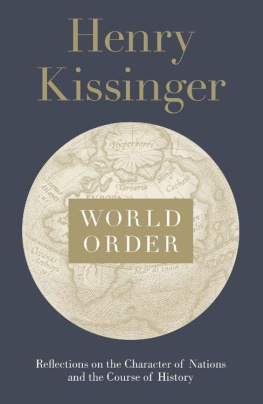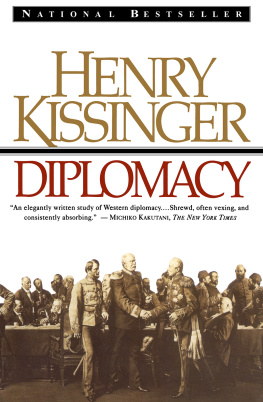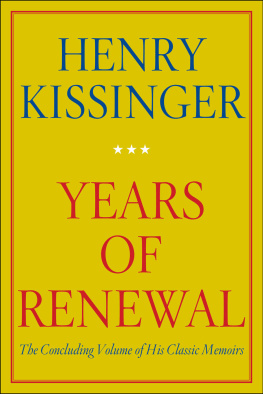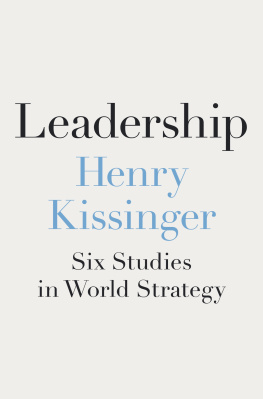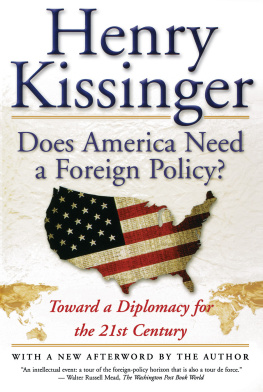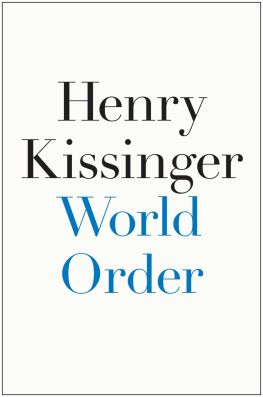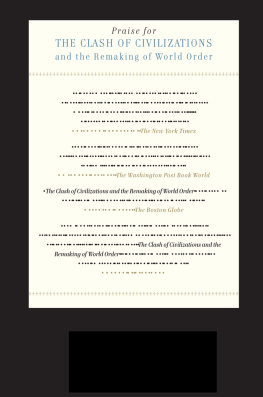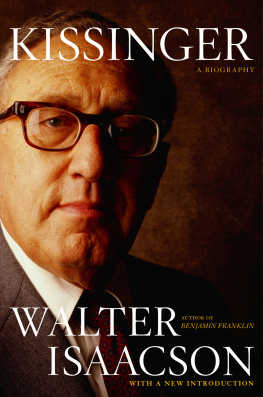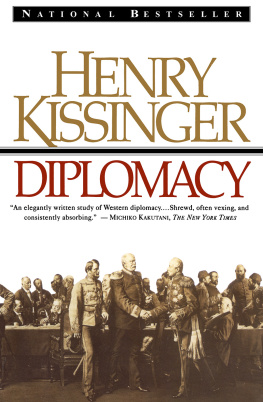Henry Kissinger - World Order: Reflections on the Character of Nations and the Course of History
Here you can read online Henry Kissinger - World Order: Reflections on the Character of Nations and the Course of History full text of the book (entire story) in english for free. Download pdf and epub, get meaning, cover and reviews about this ebook. year: 2014, publisher: Penguin Press HC, The, genre: Politics. Description of the work, (preface) as well as reviews are available. Best literature library LitArk.com created for fans of good reading and offers a wide selection of genres:
Romance novel
Science fiction
Adventure
Detective
Science
History
Home and family
Prose
Art
Politics
Computer
Non-fiction
Religion
Business
Children
Humor
Choose a favorite category and find really read worthwhile books. Enjoy immersion in the world of imagination, feel the emotions of the characters or learn something new for yourself, make an fascinating discovery.
- Book:World Order: Reflections on the Character of Nations and the Course of History
- Author:
- Publisher:Penguin Press HC, The
- Genre:
- Year:2014
- Rating:5 / 5
- Favourites:Add to favourites
- Your mark:
World Order: Reflections on the Character of Nations and the Course of History: summary, description and annotation
We offer to read an annotation, description, summary or preface (depends on what the author of the book "World Order: Reflections on the Character of Nations and the Course of History" wrote himself). If you haven't found the necessary information about the book — write in the comments, we will try to find it.
Dazzling and instructive... [a] magisterial new book.
Henry Kissinger offers in World Order a deep meditation on the roots of international harmony and global disorder. Drawing on his experience as one of the foremost statesmen of the modern eraadvising presidents, traveling the world, observing and shaping the central foreign policy events of recent decadesKissinger now reveals his analysis of the ultimate challenge for the twenty-first century: how to build a shared international order in a world of divergent historical perspectives, violent conflict, proliferating technology, and ideological extremism.
There has never been a true world order, Kissinger observes. For most of history, civilizations defined their own concepts of order. Each considered itself the center of the world and envisioned its distinct principles as universally relevant. China conceived of a global cultural hierarchy with the Emperor at its pinnacle. In Europe, Rome imagined itself surrounded by barbarians; when Rome fragmented, European peoples refined a concept of an equilibrium of sovereign states and sought to export it across the world. Islam, in its early centuries, considered itself the worlds sole legitimate political unit, destined to expand indefinitely until the world was brought into harmony by religious principles. The United States was born of a conviction about the universal applicability of democracya conviction that has guided its policies ever since.
Now international affairs take place on a global basis, and these historical concepts of world order are meeting. Every region participates in questions of high policy in every other, often instantaneously. Yet there is no consensus among the major actors about the rules and limits guiding this process, or its ultimate destination. The result is mounting tension.
Grounded in Kissingers deep study of history and his experience as National Security Advisor and Secretary of State, World Order guides readers through crucial episodes in recent world history. Kissinger offers a unique glimpse into the inner deliberations of the Nixon administrations negotiations with Hanoi over the end of the Vietnam War, as well as Ronald Reagans tense debates with Soviet Premier Gorbachev in Reykjavk. He offers compelling insights into the future of U.S.China relations and the evolution of the European Union, and examines lessons of the conflicts in Iraq and Afghanistan. Taking readers from his analysis of nuclear negotiations with Iran through the Wests response to the Arab Spring and tensions with Russia over Ukraine, World Order anchors Kissingers historical analysis in the decisive events of our time.
Provocative and articulate, blending historical insight with geopolitical prognostication, World Order is a unique work that could come only from a lifelong policymaker and diplomat.
Hillary Clinton, The Washington Post:
It is vintage Kissinger, with his singular combination of breadth and acuity along with his knack for connecting headlines to trend lines.
Michiko Kakutani, The New York Times
[C]ould not be more timely... the book puts the problems of todays world and Americas role in that increasingly interconnected and increasingly riven world into usefuland often illuminatingcontext.
The Financial Times
Kissingers conclusion deserves to be read and understood by all candidates ahead of the 2016 presidential election. World order depends on it.
John Micklethwait, The New York Times Book Review
If you think America is doing just fine, then skip ahead to the poetry reviews. If, however, you worry about a globe spinning out of control, then World Order is for you.
Henry Kissinger: author's other books
Who wrote World Order: Reflections on the Character of Nations and the Course of History? Find out the surname, the name of the author of the book and a list of all author's works by series.

